A Critical Analysis of Oil and Gas Theft in Niger Delta, Nigeria
VerifiedAdded on 2023/06/03
|55
|15412
|222
Report
AI Summary
This report provides a critical analysis of the impact of oil and gas theft in the Niger Delta region of Nigeria. It identifies the significant financial losses and economic disruptions caused by illegal bunkering and pipeline vandalism. The research explores the operational mechanisms and actors involved in oil theft, examines the efforts undertaken by the Nigerian government to combat this issue, and offers recommendations for establishing technical safeguards, such as burying pipelines, to mitigate oil and gas theft. The study aims to analyze the reasons behind illegal oil thefts, the economic perpetrators, the financial loss of revenue, and the steps the government can take to address the issue.
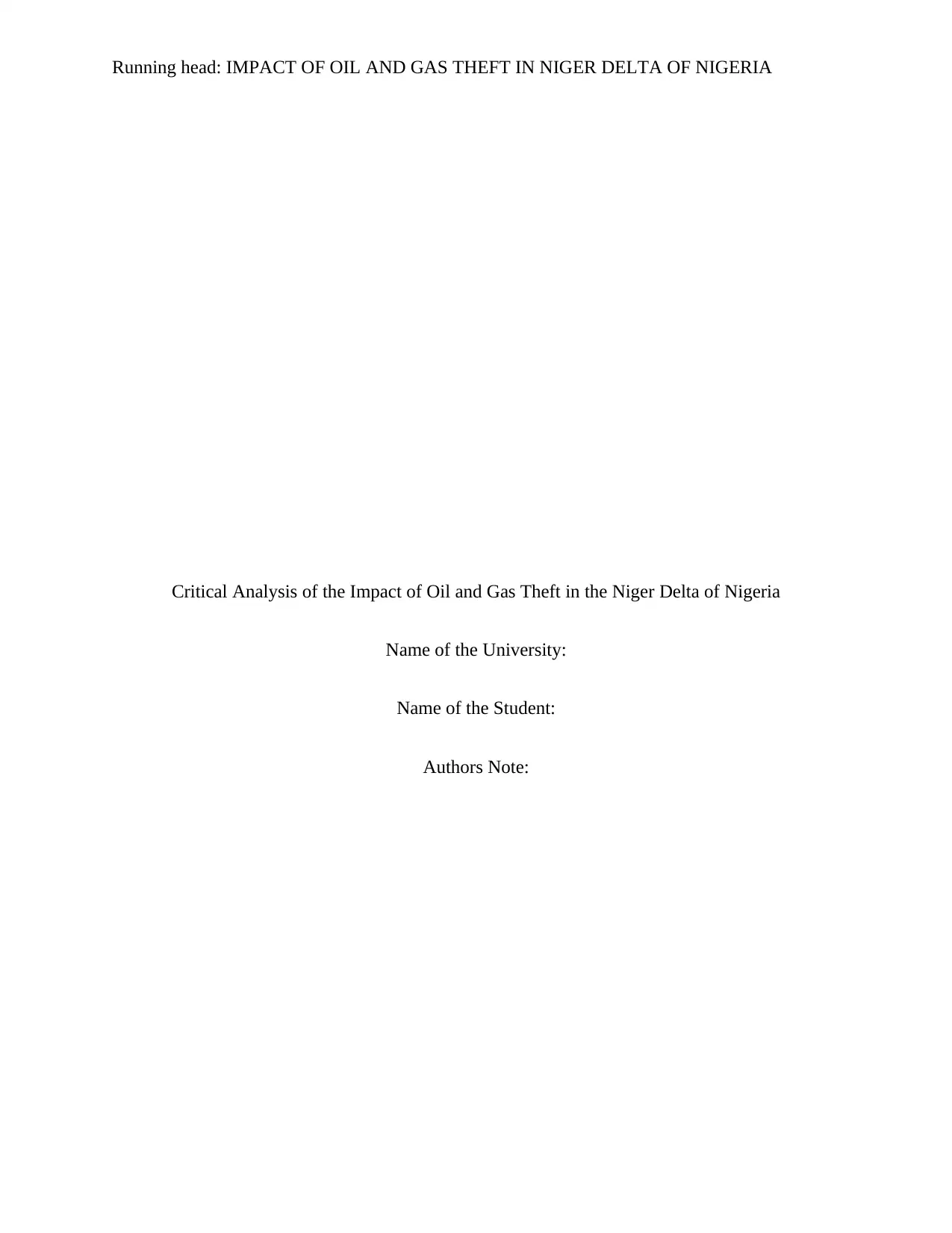
Running head: IMPACT OF OIL AND GAS THEFT IN NIGER DELTA OF NIGERIA
Critical Analysis of the Impact of Oil and Gas Theft in the Niger Delta of Nigeria
Name of the University:
Name of the Student:
Authors Note:
Critical Analysis of the Impact of Oil and Gas Theft in the Niger Delta of Nigeria
Name of the University:
Name of the Student:
Authors Note:
Paraphrase This Document
Need a fresh take? Get an instant paraphrase of this document with our AI Paraphraser
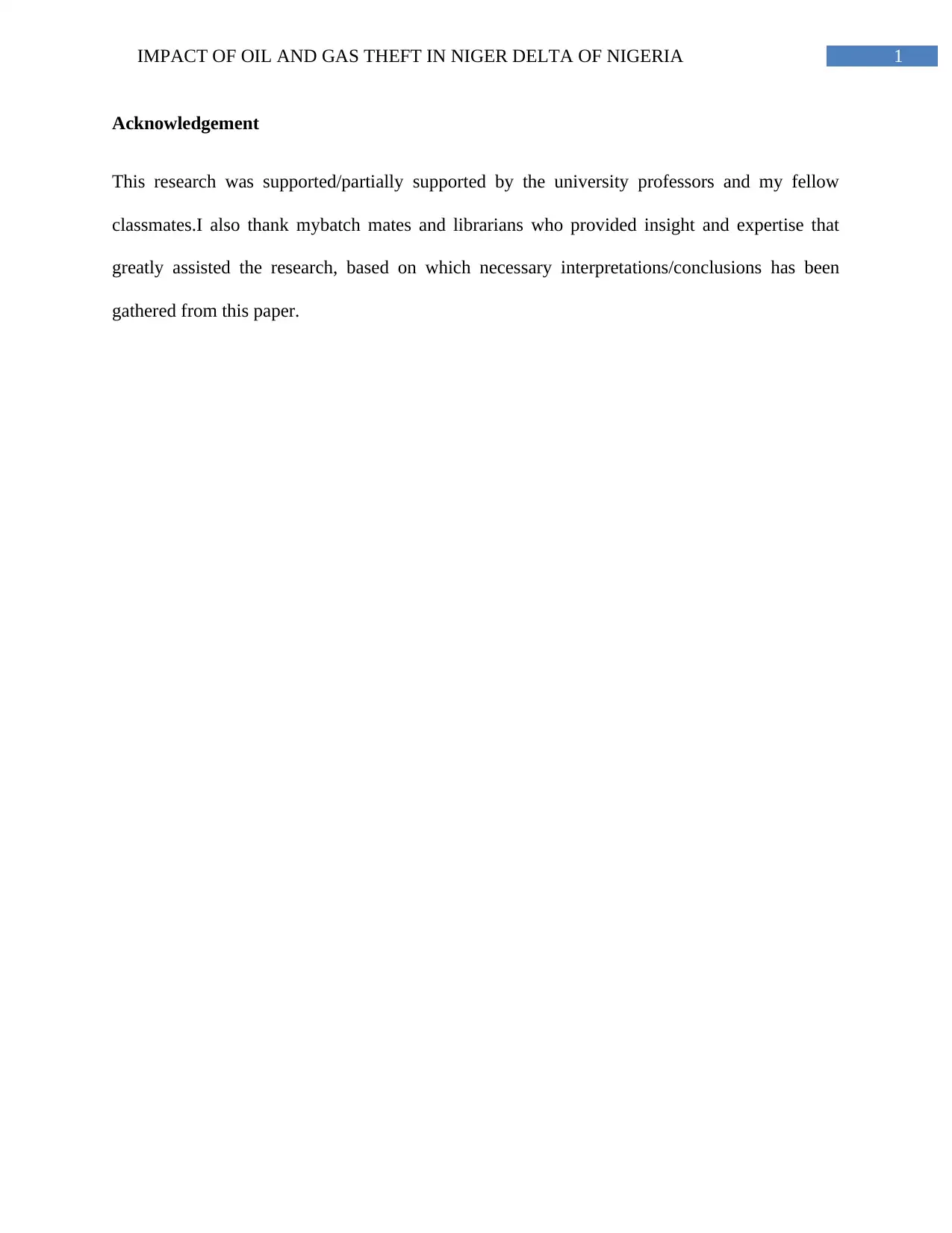
1IMPACT OF OIL AND GAS THEFT IN NIGER DELTA OF NIGERIA
Acknowledgement
This research was supported/partially supported by the university professors and my fellow
classmates.I also thank mybatch mates and librarians who provided insight and expertise that
greatly assisted the research, based on which necessary interpretations/conclusions has been
gathered from this paper.
Acknowledgement
This research was supported/partially supported by the university professors and my fellow
classmates.I also thank mybatch mates and librarians who provided insight and expertise that
greatly assisted the research, based on which necessary interpretations/conclusions has been
gathered from this paper.
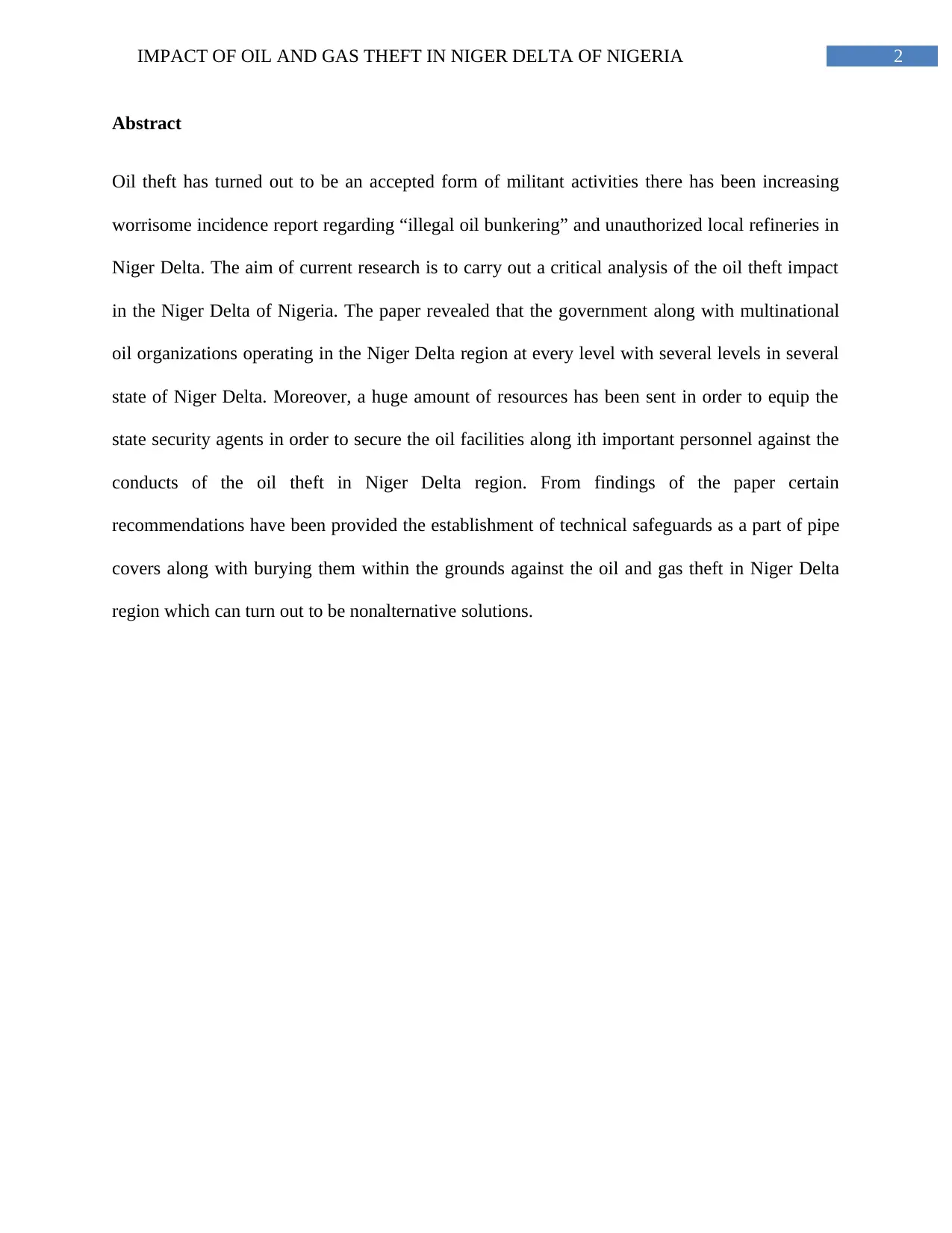
2IMPACT OF OIL AND GAS THEFT IN NIGER DELTA OF NIGERIA
Abstract
Oil theft has turned out to be an accepted form of militant activities there has been increasing
worrisome incidence report regarding “illegal oil bunkering” and unauthorized local refineries in
Niger Delta. The aim of current research is to carry out a critical analysis of the oil theft impact
in the Niger Delta of Nigeria. The paper revealed that the government along with multinational
oil organizations operating in the Niger Delta region at every level with several levels in several
state of Niger Delta. Moreover, a huge amount of resources has been sent in order to equip the
state security agents in order to secure the oil facilities along ith important personnel against the
conducts of the oil theft in Niger Delta region. From findings of the paper certain
recommendations have been provided the establishment of technical safeguards as a part of pipe
covers along with burying them within the grounds against the oil and gas theft in Niger Delta
region which can turn out to be nonalternative solutions.
Abstract
Oil theft has turned out to be an accepted form of militant activities there has been increasing
worrisome incidence report regarding “illegal oil bunkering” and unauthorized local refineries in
Niger Delta. The aim of current research is to carry out a critical analysis of the oil theft impact
in the Niger Delta of Nigeria. The paper revealed that the government along with multinational
oil organizations operating in the Niger Delta region at every level with several levels in several
state of Niger Delta. Moreover, a huge amount of resources has been sent in order to equip the
state security agents in order to secure the oil facilities along ith important personnel against the
conducts of the oil theft in Niger Delta region. From findings of the paper certain
recommendations have been provided the establishment of technical safeguards as a part of pipe
covers along with burying them within the grounds against the oil and gas theft in Niger Delta
region which can turn out to be nonalternative solutions.
⊘ This is a preview!⊘
Do you want full access?
Subscribe today to unlock all pages.

Trusted by 1+ million students worldwide
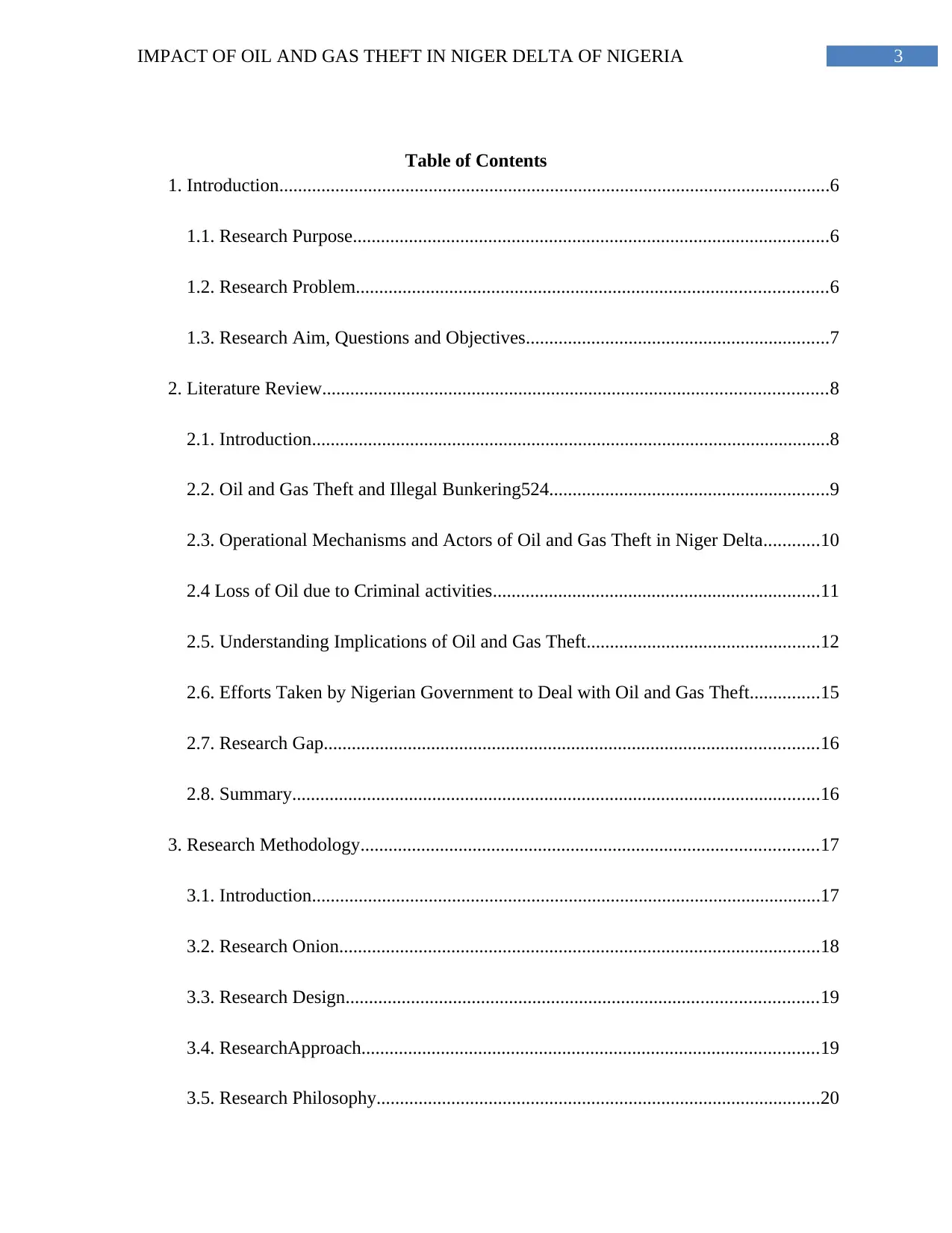
3IMPACT OF OIL AND GAS THEFT IN NIGER DELTA OF NIGERIA
Table of Contents
1. Introduction......................................................................................................................6
1.1. Research Purpose......................................................................................................6
1.2. Research Problem.....................................................................................................6
1.3. Research Aim, Questions and Objectives.................................................................7
2. Literature Review............................................................................................................8
2.1. Introduction...............................................................................................................8
2.2. Oil and Gas Theft and Illegal Bunkering524............................................................9
2.3. Operational Mechanisms and Actors of Oil and Gas Theft in Niger Delta............10
2.4 Loss of Oil due to Criminal activities......................................................................11
2.5. Understanding Implications of Oil and Gas Theft..................................................12
2.6. Efforts Taken by Nigerian Government to Deal with Oil and Gas Theft...............15
2.7. Research Gap..........................................................................................................16
2.8. Summary.................................................................................................................16
3. Research Methodology..................................................................................................17
3.1. Introduction.............................................................................................................17
3.2. Research Onion.......................................................................................................18
3.3. Research Design.....................................................................................................19
3.4. ResearchApproach..................................................................................................19
3.5. Research Philosophy...............................................................................................20
Table of Contents
1. Introduction......................................................................................................................6
1.1. Research Purpose......................................................................................................6
1.2. Research Problem.....................................................................................................6
1.3. Research Aim, Questions and Objectives.................................................................7
2. Literature Review............................................................................................................8
2.1. Introduction...............................................................................................................8
2.2. Oil and Gas Theft and Illegal Bunkering524............................................................9
2.3. Operational Mechanisms and Actors of Oil and Gas Theft in Niger Delta............10
2.4 Loss of Oil due to Criminal activities......................................................................11
2.5. Understanding Implications of Oil and Gas Theft..................................................12
2.6. Efforts Taken by Nigerian Government to Deal with Oil and Gas Theft...............15
2.7. Research Gap..........................................................................................................16
2.8. Summary.................................................................................................................16
3. Research Methodology..................................................................................................17
3.1. Introduction.............................................................................................................17
3.2. Research Onion.......................................................................................................18
3.3. Research Design.....................................................................................................19
3.4. ResearchApproach..................................................................................................19
3.5. Research Philosophy...............................................................................................20
Paraphrase This Document
Need a fresh take? Get an instant paraphrase of this document with our AI Paraphraser
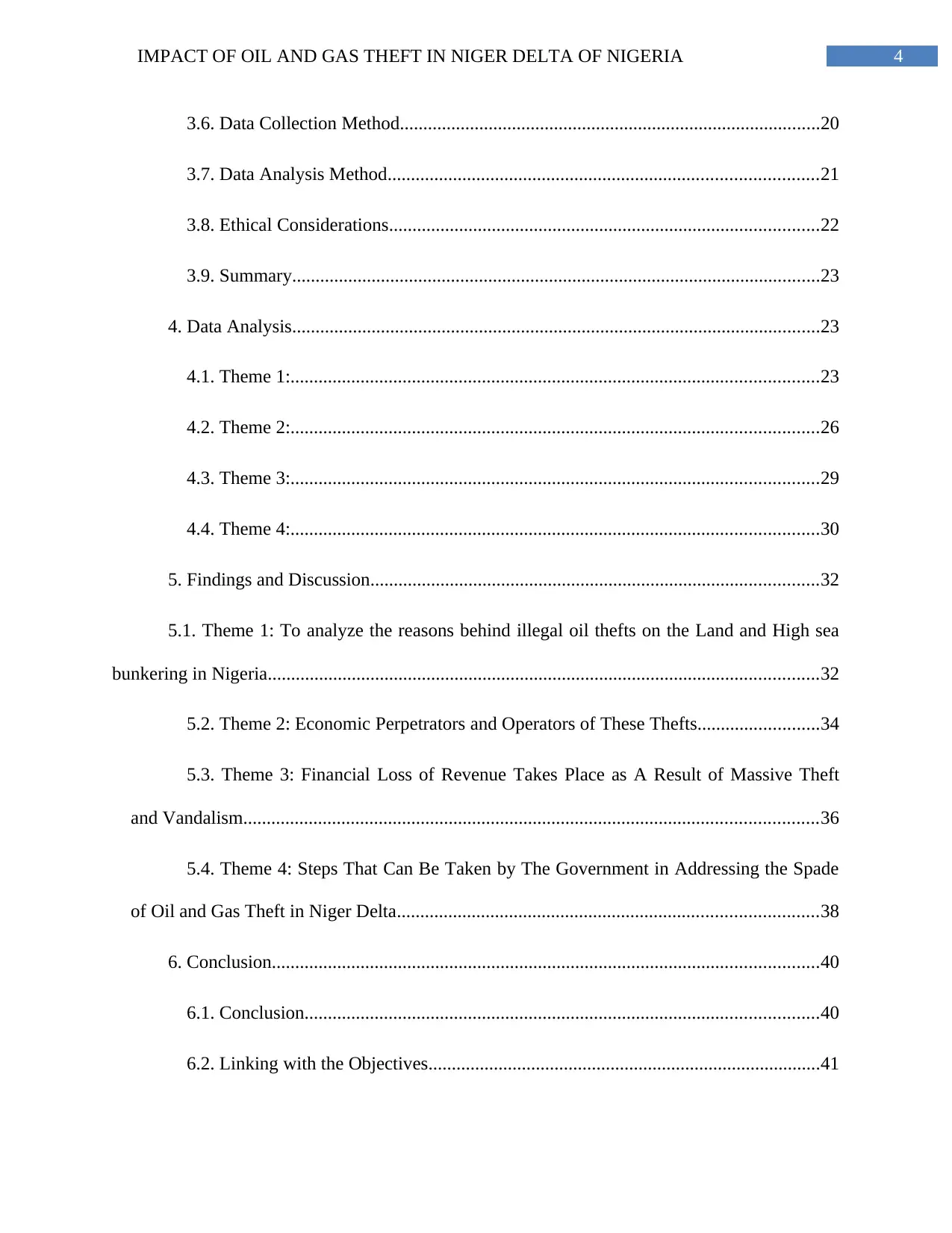
4IMPACT OF OIL AND GAS THEFT IN NIGER DELTA OF NIGERIA
3.6. Data Collection Method..........................................................................................20
3.7. Data Analysis Method............................................................................................21
3.8. Ethical Considerations............................................................................................22
3.9. Summary.................................................................................................................23
4. Data Analysis.................................................................................................................23
4.1. Theme 1:.................................................................................................................23
4.2. Theme 2:.................................................................................................................26
4.3. Theme 3:.................................................................................................................29
4.4. Theme 4:.................................................................................................................30
5. Findings and Discussion................................................................................................32
5.1. Theme 1: To analyze the reasons behind illegal oil thefts on the Land and High sea
bunkering in Nigeria......................................................................................................................32
5.2. Theme 2: Economic Perpetrators and Operators of These Thefts..........................34
5.3. Theme 3: Financial Loss of Revenue Takes Place as A Result of Massive Theft
and Vandalism...........................................................................................................................36
5.4. Theme 4: Steps That Can Be Taken by The Government in Addressing the Spade
of Oil and Gas Theft in Niger Delta..........................................................................................38
6. Conclusion.....................................................................................................................40
6.1. Conclusion..............................................................................................................40
6.2. Linking with the Objectives....................................................................................41
3.6. Data Collection Method..........................................................................................20
3.7. Data Analysis Method............................................................................................21
3.8. Ethical Considerations............................................................................................22
3.9. Summary.................................................................................................................23
4. Data Analysis.................................................................................................................23
4.1. Theme 1:.................................................................................................................23
4.2. Theme 2:.................................................................................................................26
4.3. Theme 3:.................................................................................................................29
4.4. Theme 4:.................................................................................................................30
5. Findings and Discussion................................................................................................32
5.1. Theme 1: To analyze the reasons behind illegal oil thefts on the Land and High sea
bunkering in Nigeria......................................................................................................................32
5.2. Theme 2: Economic Perpetrators and Operators of These Thefts..........................34
5.3. Theme 3: Financial Loss of Revenue Takes Place as A Result of Massive Theft
and Vandalism...........................................................................................................................36
5.4. Theme 4: Steps That Can Be Taken by The Government in Addressing the Spade
of Oil and Gas Theft in Niger Delta..........................................................................................38
6. Conclusion.....................................................................................................................40
6.1. Conclusion..............................................................................................................40
6.2. Linking with the Objectives....................................................................................41
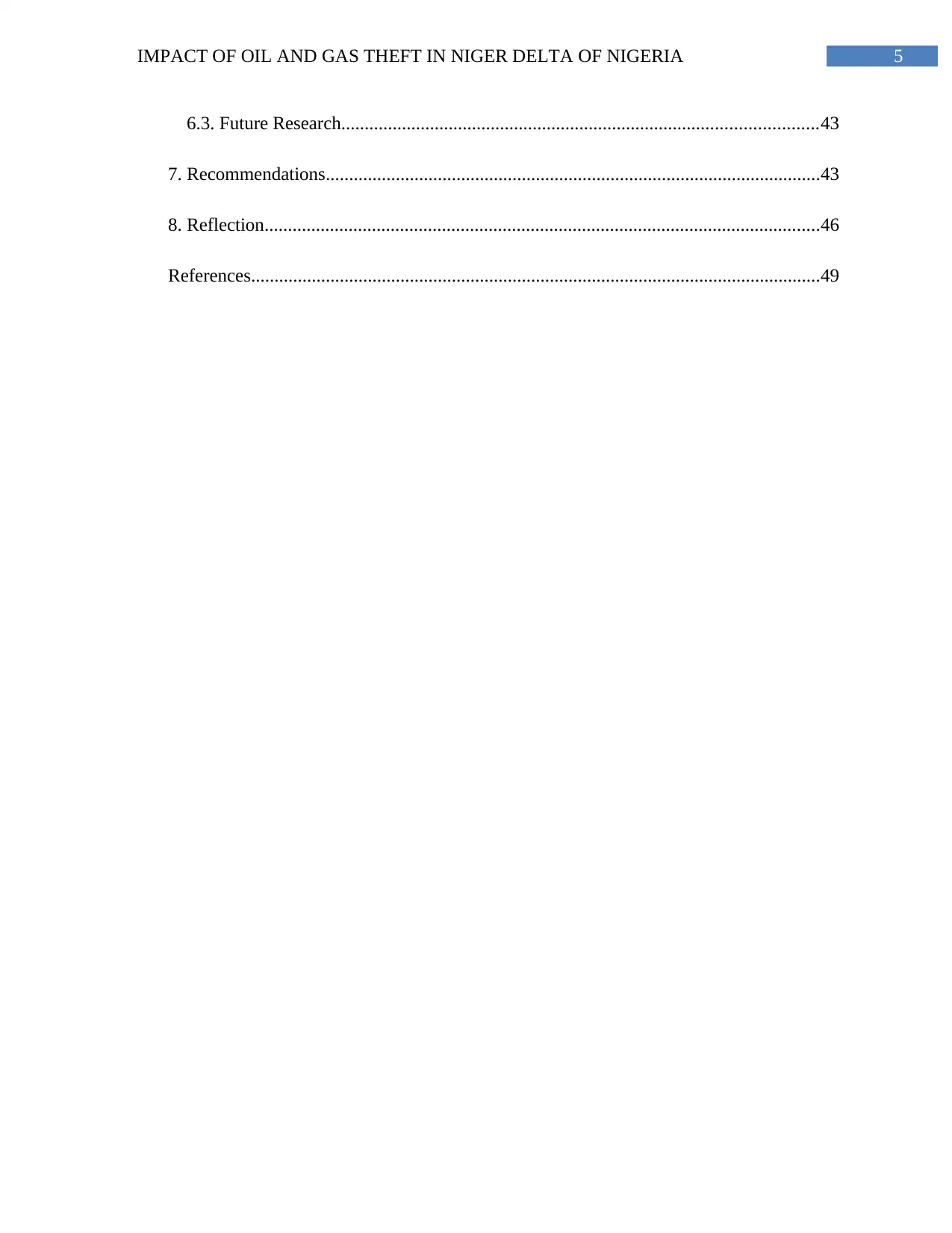
5IMPACT OF OIL AND GAS THEFT IN NIGER DELTA OF NIGERIA
6.3. Future Research......................................................................................................43
7. Recommendations..........................................................................................................43
8. Reflection.......................................................................................................................46
References..........................................................................................................................49
6.3. Future Research......................................................................................................43
7. Recommendations..........................................................................................................43
8. Reflection.......................................................................................................................46
References..........................................................................................................................49
⊘ This is a preview!⊘
Do you want full access?
Subscribe today to unlock all pages.

Trusted by 1+ million students worldwide
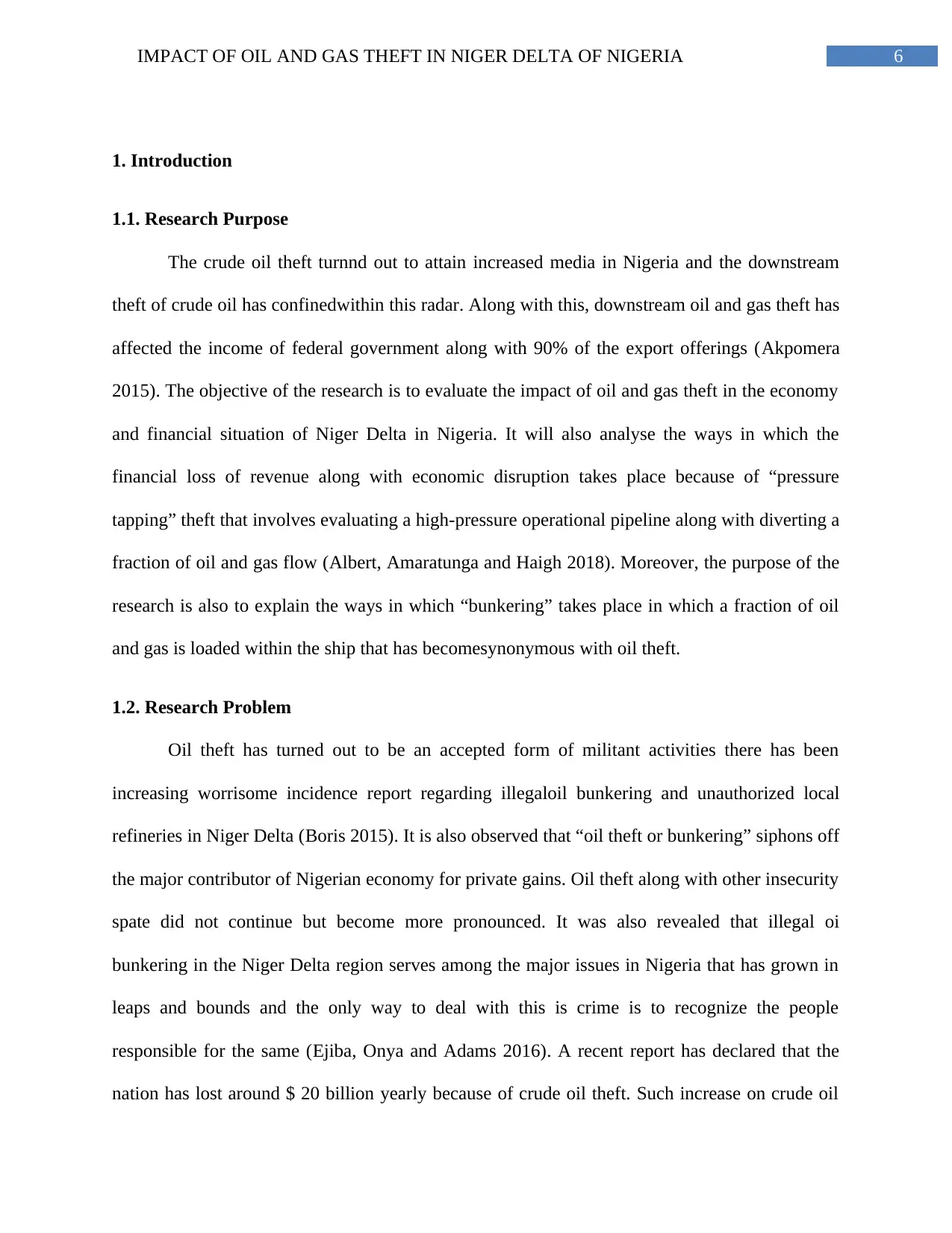
6IMPACT OF OIL AND GAS THEFT IN NIGER DELTA OF NIGERIA
1. Introduction
1.1. Research Purpose
The crude oil theft turnnd out to attain increased media in Nigeria and the downstream
theft of crude oil has confinedwithin this radar. Along with this, downstream oil and gas theft has
affected the income of federal government along with 90% of the export offerings (Akpomera
2015). The objective of the research is to evaluate the impact of oil and gas theft in the economy
and financial situation of Niger Delta in Nigeria. It will also analyse the ways in which the
financial loss of revenue along with economic disruption takes place because of “pressure
tapping” theft that involves evaluating a high-pressure operational pipeline along with diverting a
fraction of oil and gas flow (Albert, Amaratunga and Haigh 2018). Moreover, the purpose of the
research is also to explain the ways in which “bunkering” takes place in which a fraction of oil
and gas is loaded within the ship that has becomesynonymous with oil theft.
1.2. Research Problem
Oil theft has turned out to be an accepted form of militant activities there has been
increasing worrisome incidence report regarding illegaloil bunkering and unauthorized local
refineries in Niger Delta (Boris 2015). It is also observed that “oil theft or bunkering” siphons off
the major contributor of Nigerian economy for private gains. Oil theft along with other insecurity
spate did not continue but become more pronounced. It was also revealed that illegal oi
bunkering in the Niger Delta region serves among the major issues in Nigeria that has grown in
leaps and bounds and the only way to deal with this is crime is to recognize the people
responsible for the same (Ejiba, Onya and Adams 2016). A recent report has declared that the
nation has lost around $ 20 billion yearly because of crude oil theft. Such increase on crude oil
1. Introduction
1.1. Research Purpose
The crude oil theft turnnd out to attain increased media in Nigeria and the downstream
theft of crude oil has confinedwithin this radar. Along with this, downstream oil and gas theft has
affected the income of federal government along with 90% of the export offerings (Akpomera
2015). The objective of the research is to evaluate the impact of oil and gas theft in the economy
and financial situation of Niger Delta in Nigeria. It will also analyse the ways in which the
financial loss of revenue along with economic disruption takes place because of “pressure
tapping” theft that involves evaluating a high-pressure operational pipeline along with diverting a
fraction of oil and gas flow (Albert, Amaratunga and Haigh 2018). Moreover, the purpose of the
research is also to explain the ways in which “bunkering” takes place in which a fraction of oil
and gas is loaded within the ship that has becomesynonymous with oil theft.
1.2. Research Problem
Oil theft has turned out to be an accepted form of militant activities there has been
increasing worrisome incidence report regarding illegaloil bunkering and unauthorized local
refineries in Niger Delta (Boris 2015). It is also observed that “oil theft or bunkering” siphons off
the major contributor of Nigerian economy for private gains. Oil theft along with other insecurity
spate did not continue but become more pronounced. It was also revealed that illegal oi
bunkering in the Niger Delta region serves among the major issues in Nigeria that has grown in
leaps and bounds and the only way to deal with this is crime is to recognize the people
responsible for the same (Ejiba, Onya and Adams 2016). A recent report has declared that the
nation has lost around $ 20 billion yearly because of crude oil theft. Such increase on crude oil
Paraphrase This Document
Need a fresh take? Get an instant paraphrase of this document with our AI Paraphraser
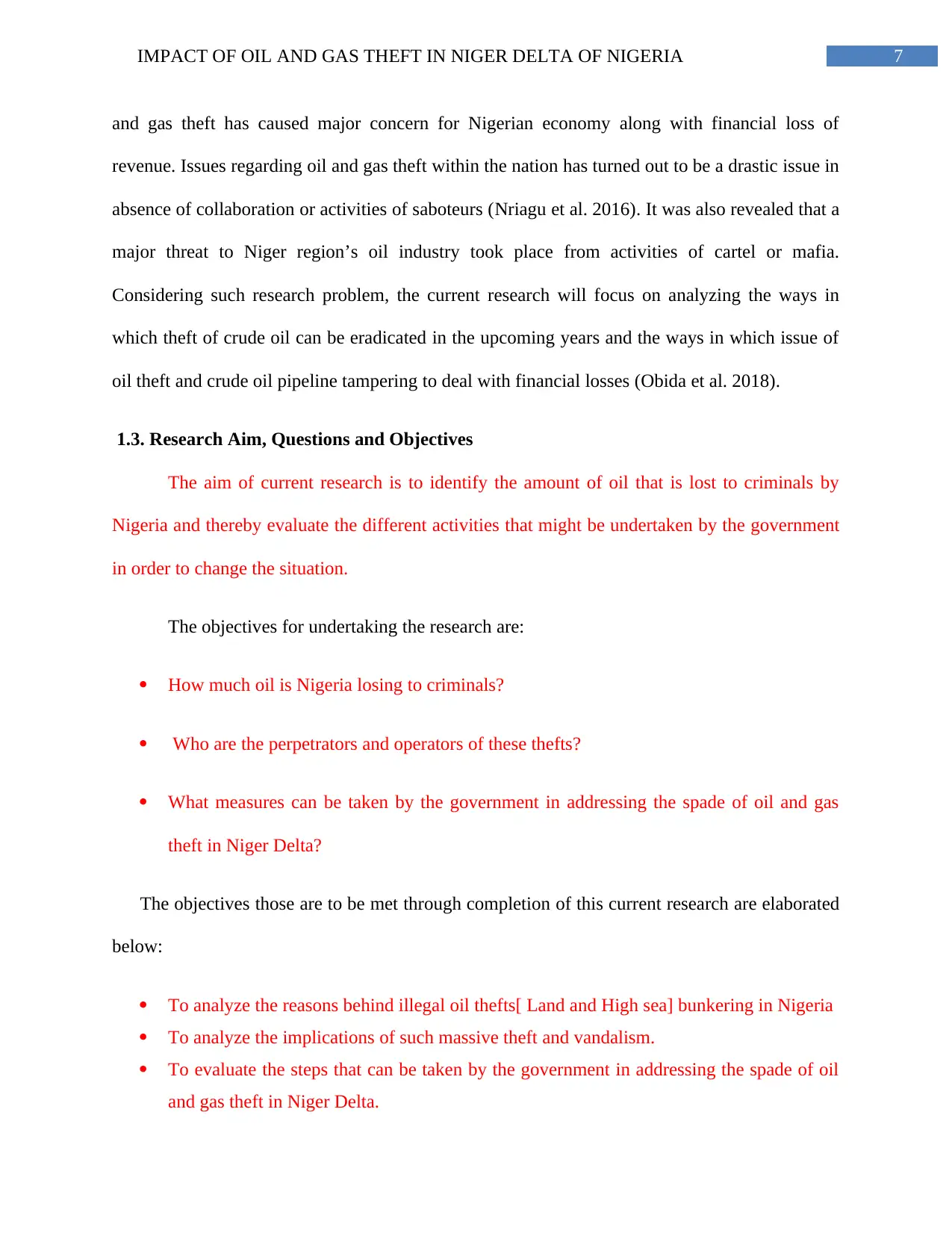
7IMPACT OF OIL AND GAS THEFT IN NIGER DELTA OF NIGERIA
and gas theft has caused major concern for Nigerian economy along with financial loss of
revenue. Issues regarding oil and gas theft within the nation has turned out to be a drastic issue in
absence of collaboration or activities of saboteurs (Nriagu et al. 2016). It was also revealed that a
major threat to Niger region’s oil industry took place from activities of cartel or mafia.
Considering such research problem, the current research will focus on analyzing the ways in
which theft of crude oil can be eradicated in the upcoming years and the ways in which issue of
oil theft and crude oil pipeline tampering to deal with financial losses (Obida et al. 2018).
1.3. Research Aim, Questions and Objectives
The aim of current research is to identify the amount of oil that is lost to criminals by
Nigeria and thereby evaluate the different activities that might be undertaken by the government
in order to change the situation.
The objectives for undertaking the research are:
How much oil is Nigeria losing to criminals?
Who are the perpetrators and operators of these thefts?
What measures can be taken by the government in addressing the spade of oil and gas
theft in Niger Delta?
The objectives those are to be met through completion of this current research are elaborated
below:
To analyze the reasons behind illegal oil thefts[ Land and High sea] bunkering in Nigeria
To analyze the implications of such massive theft and vandalism.
To evaluate the steps that can be taken by the government in addressing the spade of oil
and gas theft in Niger Delta.
and gas theft has caused major concern for Nigerian economy along with financial loss of
revenue. Issues regarding oil and gas theft within the nation has turned out to be a drastic issue in
absence of collaboration or activities of saboteurs (Nriagu et al. 2016). It was also revealed that a
major threat to Niger region’s oil industry took place from activities of cartel or mafia.
Considering such research problem, the current research will focus on analyzing the ways in
which theft of crude oil can be eradicated in the upcoming years and the ways in which issue of
oil theft and crude oil pipeline tampering to deal with financial losses (Obida et al. 2018).
1.3. Research Aim, Questions and Objectives
The aim of current research is to identify the amount of oil that is lost to criminals by
Nigeria and thereby evaluate the different activities that might be undertaken by the government
in order to change the situation.
The objectives for undertaking the research are:
How much oil is Nigeria losing to criminals?
Who are the perpetrators and operators of these thefts?
What measures can be taken by the government in addressing the spade of oil and gas
theft in Niger Delta?
The objectives those are to be met through completion of this current research are elaborated
below:
To analyze the reasons behind illegal oil thefts[ Land and High sea] bunkering in Nigeria
To analyze the implications of such massive theft and vandalism.
To evaluate the steps that can be taken by the government in addressing the spade of oil
and gas theft in Niger Delta.
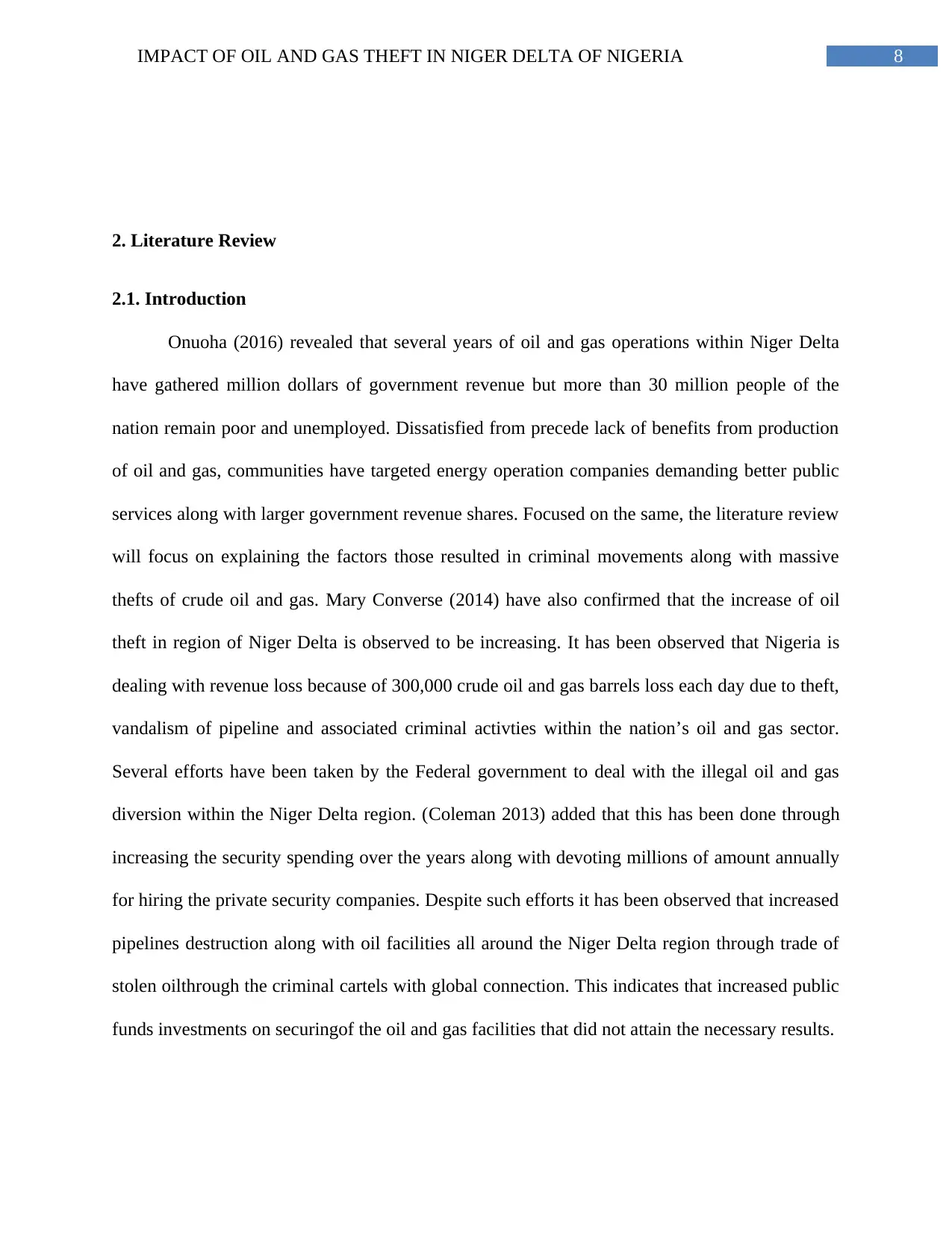
8IMPACT OF OIL AND GAS THEFT IN NIGER DELTA OF NIGERIA
2. Literature Review
2.1. Introduction
Onuoha (2016) revealed that several years of oil and gas operations within Niger Delta
have gathered million dollars of government revenue but more than 30 million people of the
nation remain poor and unemployed. Dissatisfied from precede lack of benefits from production
of oil and gas, communities have targeted energy operation companies demanding better public
services along with larger government revenue shares. Focused on the same, the literature review
will focus on explaining the factors those resulted in criminal movements along with massive
thefts of crude oil and gas. Mary Converse (2014) have also confirmed that the increase of oil
theft in region of Niger Delta is observed to be increasing. It has been observed that Nigeria is
dealing with revenue loss because of 300,000 crude oil and gas barrels loss each day due to theft,
vandalism of pipeline and associated criminal activties within the nation’s oil and gas sector.
Several efforts have been taken by the Federal government to deal with the illegal oil and gas
diversion within the Niger Delta region. (Coleman 2013) added that this has been done through
increasing the security spending over the years along with devoting millions of amount annually
for hiring the private security companies. Despite such efforts it has been observed that increased
pipelines destruction along with oil facilities all around the Niger Delta region through trade of
stolen oilthrough the criminal cartels with global connection. This indicates that increased public
funds investments on securingof the oil and gas facilities that did not attain the necessary results.
2. Literature Review
2.1. Introduction
Onuoha (2016) revealed that several years of oil and gas operations within Niger Delta
have gathered million dollars of government revenue but more than 30 million people of the
nation remain poor and unemployed. Dissatisfied from precede lack of benefits from production
of oil and gas, communities have targeted energy operation companies demanding better public
services along with larger government revenue shares. Focused on the same, the literature review
will focus on explaining the factors those resulted in criminal movements along with massive
thefts of crude oil and gas. Mary Converse (2014) have also confirmed that the increase of oil
theft in region of Niger Delta is observed to be increasing. It has been observed that Nigeria is
dealing with revenue loss because of 300,000 crude oil and gas barrels loss each day due to theft,
vandalism of pipeline and associated criminal activties within the nation’s oil and gas sector.
Several efforts have been taken by the Federal government to deal with the illegal oil and gas
diversion within the Niger Delta region. (Coleman 2013) added that this has been done through
increasing the security spending over the years along with devoting millions of amount annually
for hiring the private security companies. Despite such efforts it has been observed that increased
pipelines destruction along with oil facilities all around the Niger Delta region through trade of
stolen oilthrough the criminal cartels with global connection. This indicates that increased public
funds investments on securingof the oil and gas facilities that did not attain the necessary results.
⊘ This is a preview!⊘
Do you want full access?
Subscribe today to unlock all pages.

Trusted by 1+ million students worldwide
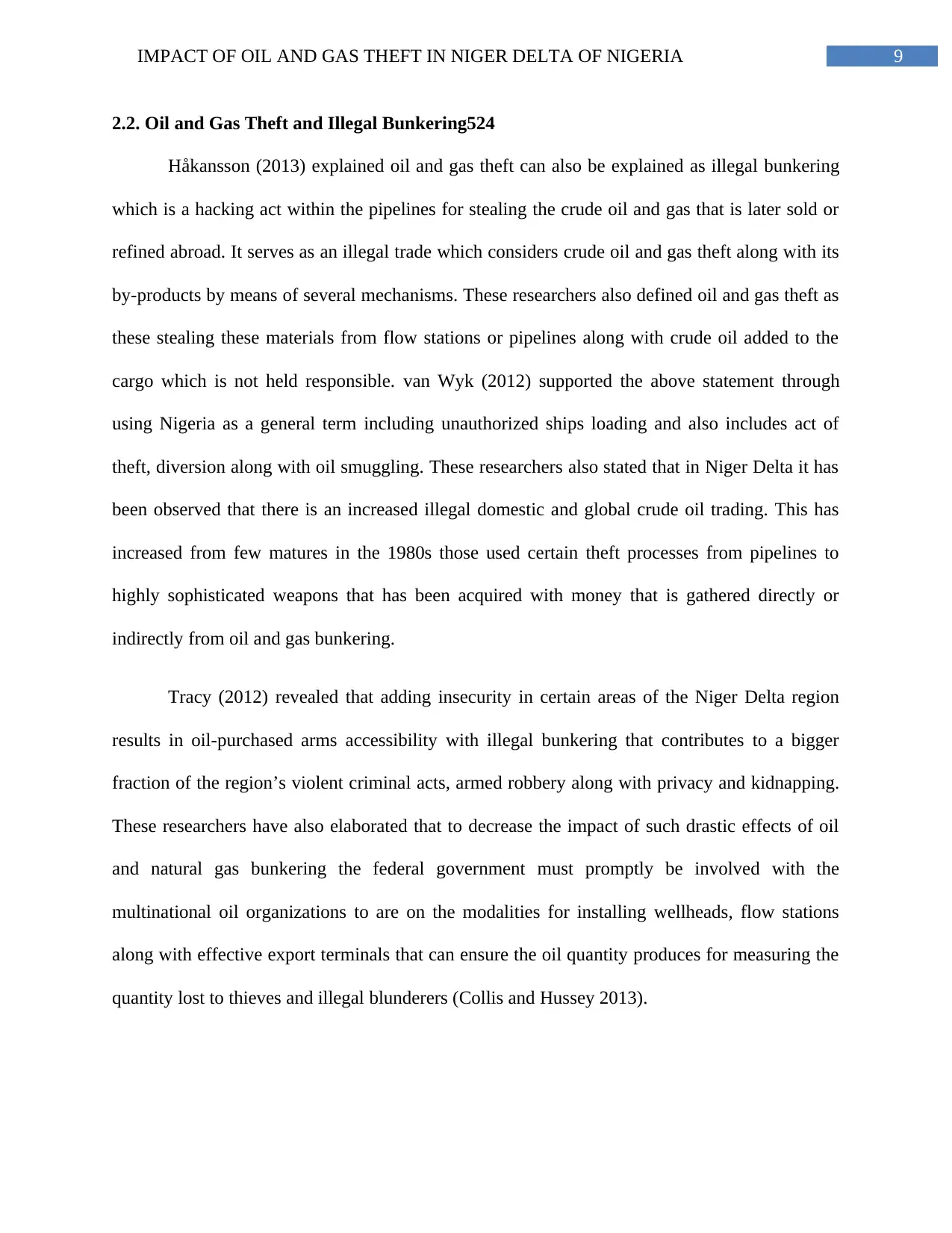
9IMPACT OF OIL AND GAS THEFT IN NIGER DELTA OF NIGERIA
2.2. Oil and Gas Theft and Illegal Bunkering524
Håkansson (2013) explained oil and gas theft can also be explained as illegal bunkering
which is a hacking act within the pipelines for stealing the crude oil and gas that is later sold or
refined abroad. It serves as an illegal trade which considers crude oil and gas theft along with its
by-products by means of several mechanisms. These researchers also defined oil and gas theft as
these stealing these materials from flow stations or pipelines along with crude oil added to the
cargo which is not held responsible. van Wyk (2012) supported the above statement through
using Nigeria as a general term including unauthorized ships loading and also includes act of
theft, diversion along with oil smuggling. These researchers also stated that in Niger Delta it has
been observed that there is an increased illegal domestic and global crude oil trading. This has
increased from few matures in the 1980s those used certain theft processes from pipelines to
highly sophisticated weapons that has been acquired with money that is gathered directly or
indirectly from oil and gas bunkering.
Tracy (2012) revealed that adding insecurity in certain areas of the Niger Delta region
results in oil-purchased arms accessibility with illegal bunkering that contributes to a bigger
fraction of the region’s violent criminal acts, armed robbery along with privacy and kidnapping.
These researchers have also elaborated that to decrease the impact of such drastic effects of oil
and natural gas bunkering the federal government must promptly be involved with the
multinational oil organizations to are on the modalities for installing wellheads, flow stations
along with effective export terminals that can ensure the oil quantity produces for measuring the
quantity lost to thieves and illegal blunderers (Collis and Hussey 2013).
2.2. Oil and Gas Theft and Illegal Bunkering524
Håkansson (2013) explained oil and gas theft can also be explained as illegal bunkering
which is a hacking act within the pipelines for stealing the crude oil and gas that is later sold or
refined abroad. It serves as an illegal trade which considers crude oil and gas theft along with its
by-products by means of several mechanisms. These researchers also defined oil and gas theft as
these stealing these materials from flow stations or pipelines along with crude oil added to the
cargo which is not held responsible. van Wyk (2012) supported the above statement through
using Nigeria as a general term including unauthorized ships loading and also includes act of
theft, diversion along with oil smuggling. These researchers also stated that in Niger Delta it has
been observed that there is an increased illegal domestic and global crude oil trading. This has
increased from few matures in the 1980s those used certain theft processes from pipelines to
highly sophisticated weapons that has been acquired with money that is gathered directly or
indirectly from oil and gas bunkering.
Tracy (2012) revealed that adding insecurity in certain areas of the Niger Delta region
results in oil-purchased arms accessibility with illegal bunkering that contributes to a bigger
fraction of the region’s violent criminal acts, armed robbery along with privacy and kidnapping.
These researchers have also elaborated that to decrease the impact of such drastic effects of oil
and natural gas bunkering the federal government must promptly be involved with the
multinational oil organizations to are on the modalities for installing wellheads, flow stations
along with effective export terminals that can ensure the oil quantity produces for measuring the
quantity lost to thieves and illegal blunderers (Collis and Hussey 2013).
Paraphrase This Document
Need a fresh take? Get an instant paraphrase of this document with our AI Paraphraser
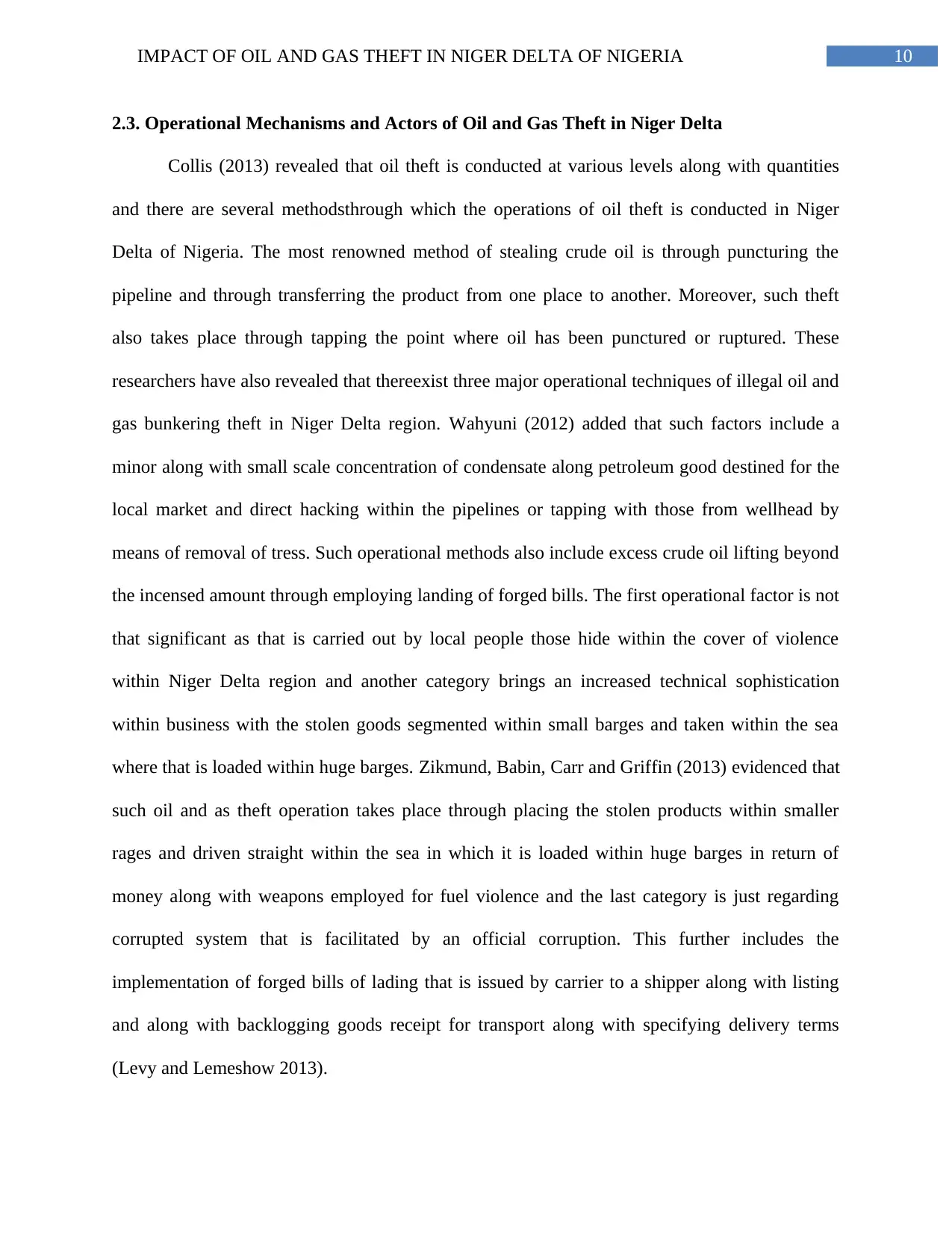
10IMPACT OF OIL AND GAS THEFT IN NIGER DELTA OF NIGERIA
2.3. Operational Mechanisms and Actors of Oil and Gas Theft in Niger Delta
Collis (2013) revealed that oil theft is conducted at various levels along with quantities
and there are several methodsthrough which the operations of oil theft is conducted in Niger
Delta of Nigeria. The most renowned method of stealing crude oil is through puncturing the
pipeline and through transferring the product from one place to another. Moreover, such theft
also takes place through tapping the point where oil has been punctured or ruptured. These
researchers have also revealed that thereexist three major operational techniques of illegal oil and
gas bunkering theft in Niger Delta region. Wahyuni (2012) added that such factors include a
minor along with small scale concentration of condensate along petroleum good destined for the
local market and direct hacking within the pipelines or tapping with those from wellhead by
means of removal of tress. Such operational methods also include excess crude oil lifting beyond
the incensed amount through employing landing of forged bills. The first operational factor is not
that significant as that is carried out by local people those hide within the cover of violence
within Niger Delta region and another category brings an increased technical sophistication
within business with the stolen goods segmented within small barges and taken within the sea
where that is loaded within huge barges. Zikmund, Babin, Carr and Griffin (2013) evidenced that
such oil and as theft operation takes place through placing the stolen products within smaller
rages and driven straight within the sea in which it is loaded within huge barges in return of
money along with weapons employed for fuel violence and the last category is just regarding
corrupted system that is facilitated by an official corruption. This further includes the
implementation of forged bills of lading that is issued by carrier to a shipper along with listing
and along with backlogging goods receipt for transport along with specifying delivery terms
(Levy and Lemeshow 2013).
2.3. Operational Mechanisms and Actors of Oil and Gas Theft in Niger Delta
Collis (2013) revealed that oil theft is conducted at various levels along with quantities
and there are several methodsthrough which the operations of oil theft is conducted in Niger
Delta of Nigeria. The most renowned method of stealing crude oil is through puncturing the
pipeline and through transferring the product from one place to another. Moreover, such theft
also takes place through tapping the point where oil has been punctured or ruptured. These
researchers have also revealed that thereexist three major operational techniques of illegal oil and
gas bunkering theft in Niger Delta region. Wahyuni (2012) added that such factors include a
minor along with small scale concentration of condensate along petroleum good destined for the
local market and direct hacking within the pipelines or tapping with those from wellhead by
means of removal of tress. Such operational methods also include excess crude oil lifting beyond
the incensed amount through employing landing of forged bills. The first operational factor is not
that significant as that is carried out by local people those hide within the cover of violence
within Niger Delta region and another category brings an increased technical sophistication
within business with the stolen goods segmented within small barges and taken within the sea
where that is loaded within huge barges. Zikmund, Babin, Carr and Griffin (2013) evidenced that
such oil and as theft operation takes place through placing the stolen products within smaller
rages and driven straight within the sea in which it is loaded within huge barges in return of
money along with weapons employed for fuel violence and the last category is just regarding
corrupted system that is facilitated by an official corruption. This further includes the
implementation of forged bills of lading that is issued by carrier to a shipper along with listing
and along with backlogging goods receipt for transport along with specifying delivery terms
(Levy and Lemeshow 2013).
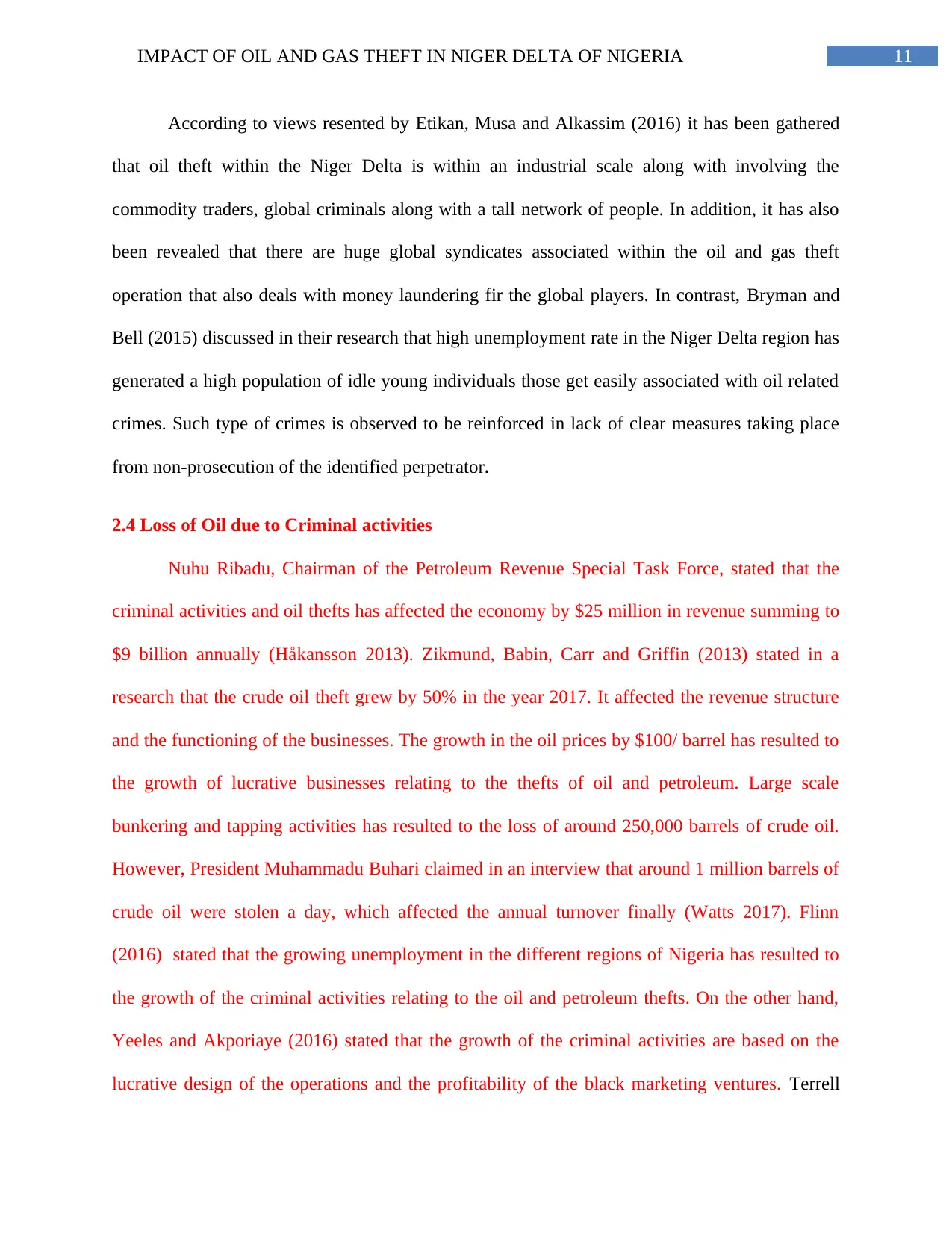
11IMPACT OF OIL AND GAS THEFT IN NIGER DELTA OF NIGERIA
According to views resented by Etikan, Musa and Alkassim (2016) it has been gathered
that oil theft within the Niger Delta is within an industrial scale along with involving the
commodity traders, global criminals along with a tall network of people. In addition, it has also
been revealed that there are huge global syndicates associated within the oil and gas theft
operation that also deals with money laundering fir the global players. In contrast, Bryman and
Bell (2015) discussed in their research that high unemployment rate in the Niger Delta region has
generated a high population of idle young individuals those get easily associated with oil related
crimes. Such type of crimes is observed to be reinforced in lack of clear measures taking place
from non-prosecution of the identified perpetrator.
2.4 Loss of Oil due to Criminal activities
Nuhu Ribadu, Chairman of the Petroleum Revenue Special Task Force, stated that the
criminal activities and oil thefts has affected the economy by $25 million in revenue summing to
$9 billion annually (Håkansson 2013). Zikmund, Babin, Carr and Griffin (2013) stated in a
research that the crude oil theft grew by 50% in the year 2017. It affected the revenue structure
and the functioning of the businesses. The growth in the oil prices by $100/ barrel has resulted to
the growth of lucrative businesses relating to the thefts of oil and petroleum. Large scale
bunkering and tapping activities has resulted to the loss of around 250,000 barrels of crude oil.
However, President Muhammadu Buhari claimed in an interview that around 1 million barrels of
crude oil were stolen a day, which affected the annual turnover finally (Watts 2017). Flinn
(2016) stated that the growing unemployment in the different regions of Nigeria has resulted to
the growth of the criminal activities relating to the oil and petroleum thefts. On the other hand,
Yeeles and Akporiaye (2016) stated that the growth of the criminal activities are based on the
lucrative design of the operations and the profitability of the black marketing ventures. Terrell
According to views resented by Etikan, Musa and Alkassim (2016) it has been gathered
that oil theft within the Niger Delta is within an industrial scale along with involving the
commodity traders, global criminals along with a tall network of people. In addition, it has also
been revealed that there are huge global syndicates associated within the oil and gas theft
operation that also deals with money laundering fir the global players. In contrast, Bryman and
Bell (2015) discussed in their research that high unemployment rate in the Niger Delta region has
generated a high population of idle young individuals those get easily associated with oil related
crimes. Such type of crimes is observed to be reinforced in lack of clear measures taking place
from non-prosecution of the identified perpetrator.
2.4 Loss of Oil due to Criminal activities
Nuhu Ribadu, Chairman of the Petroleum Revenue Special Task Force, stated that the
criminal activities and oil thefts has affected the economy by $25 million in revenue summing to
$9 billion annually (Håkansson 2013). Zikmund, Babin, Carr and Griffin (2013) stated in a
research that the crude oil theft grew by 50% in the year 2017. It affected the revenue structure
and the functioning of the businesses. The growth in the oil prices by $100/ barrel has resulted to
the growth of lucrative businesses relating to the thefts of oil and petroleum. Large scale
bunkering and tapping activities has resulted to the loss of around 250,000 barrels of crude oil.
However, President Muhammadu Buhari claimed in an interview that around 1 million barrels of
crude oil were stolen a day, which affected the annual turnover finally (Watts 2017). Flinn
(2016) stated that the growing unemployment in the different regions of Nigeria has resulted to
the growth of the criminal activities relating to the oil and petroleum thefts. On the other hand,
Yeeles and Akporiaye (2016) stated that the growth of the criminal activities are based on the
lucrative design of the operations and the profitability of the black marketing ventures. Terrell
⊘ This is a preview!⊘
Do you want full access?
Subscribe today to unlock all pages.

Trusted by 1+ million students worldwide
1 out of 55
Related Documents
Your All-in-One AI-Powered Toolkit for Academic Success.
+13062052269
info@desklib.com
Available 24*7 on WhatsApp / Email
![[object Object]](/_next/static/media/star-bottom.7253800d.svg)
Unlock your academic potential
Copyright © 2020–2026 A2Z Services. All Rights Reserved. Developed and managed by ZUCOL.





